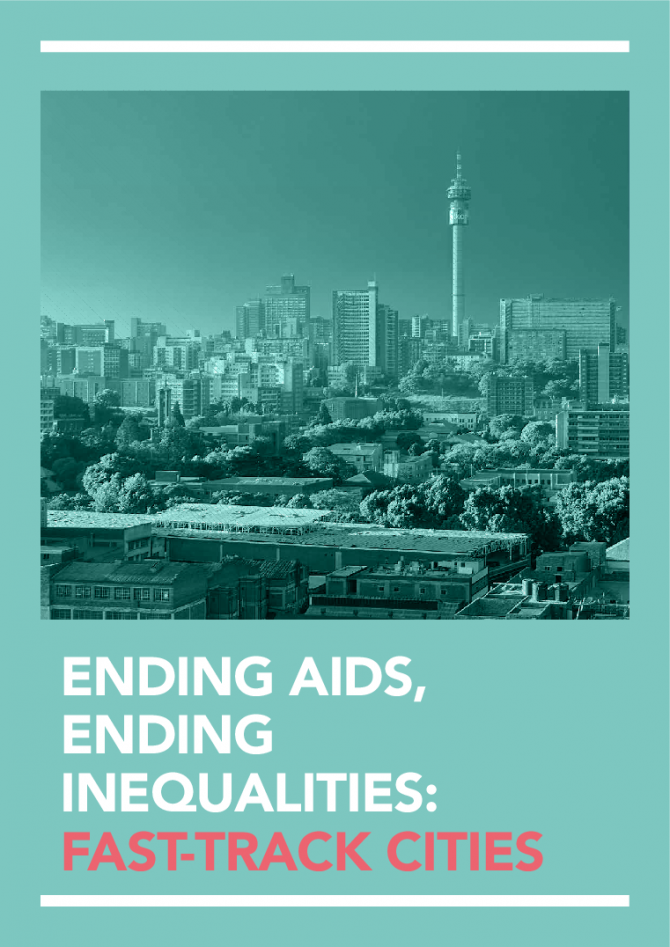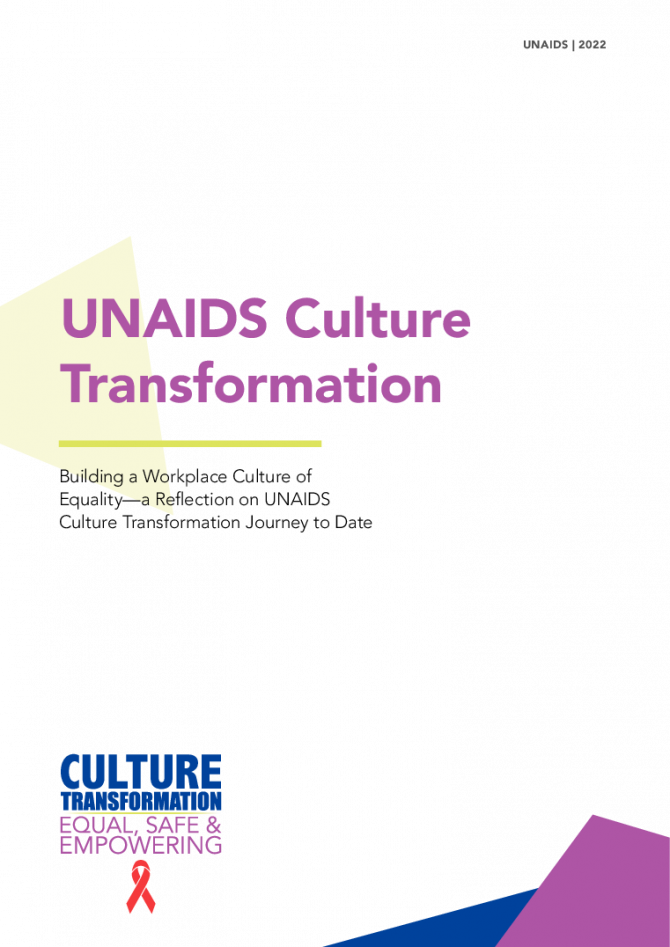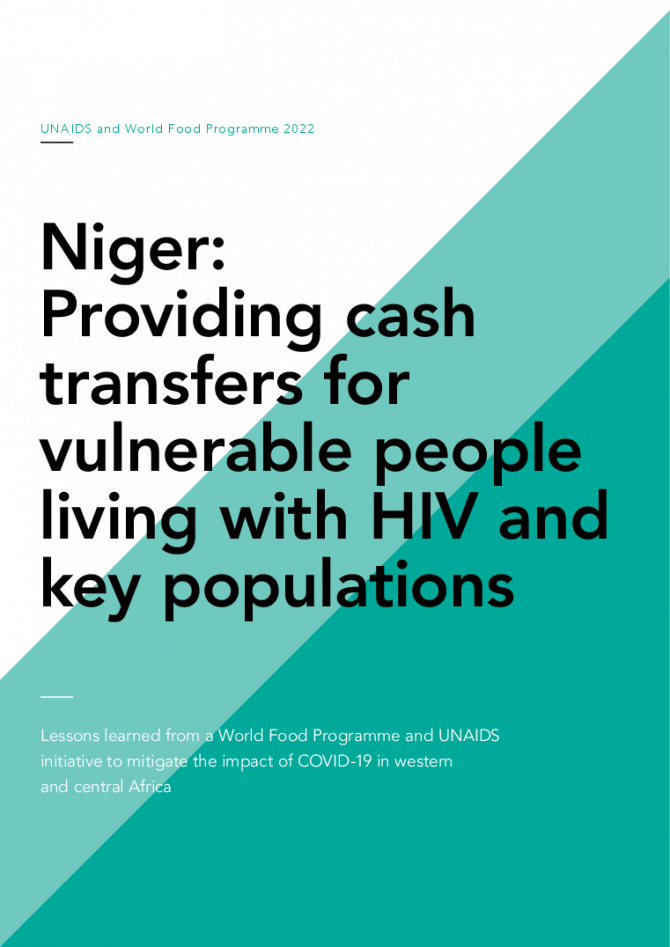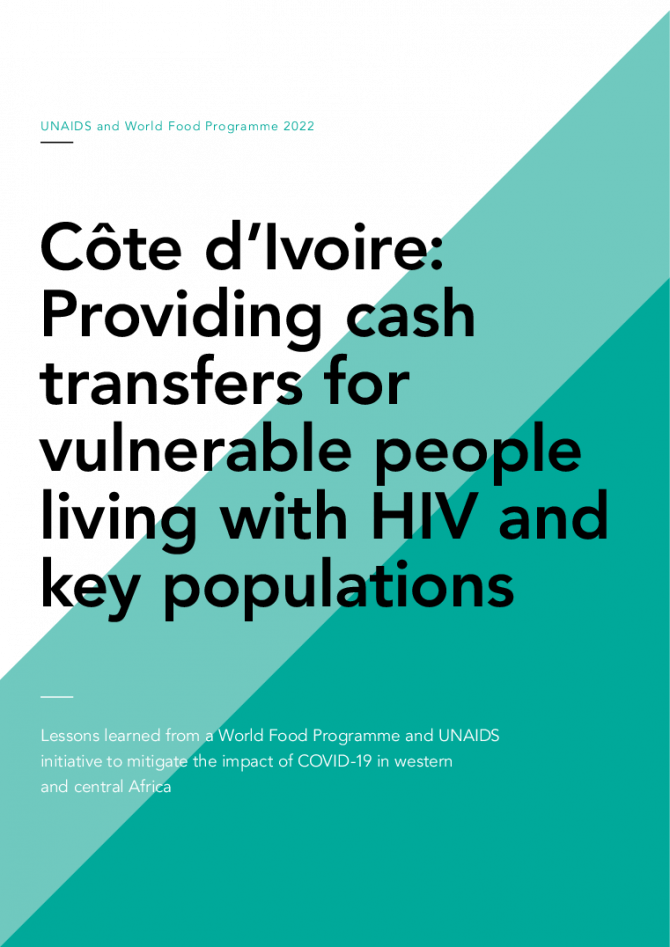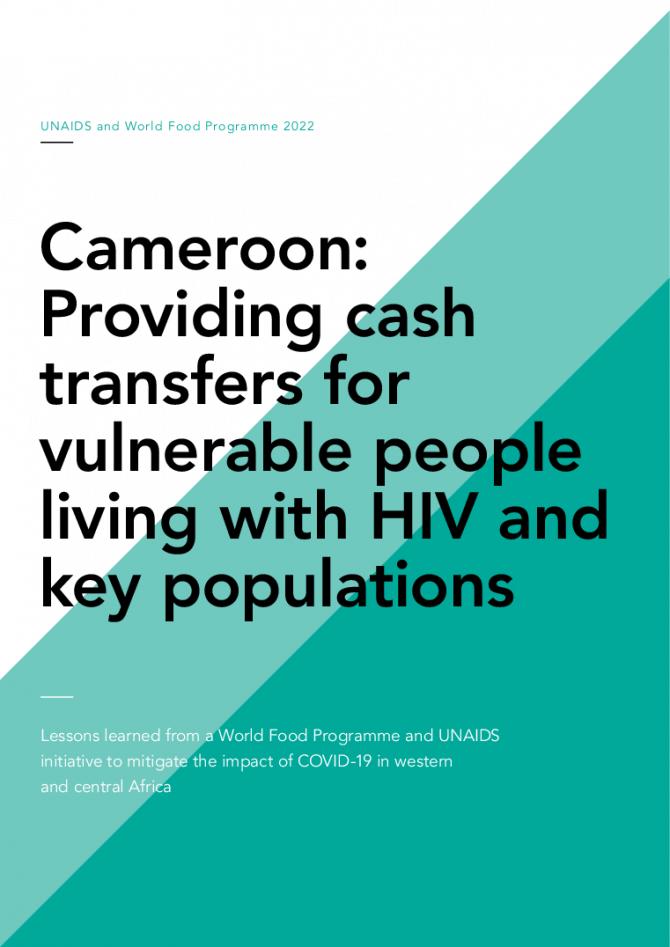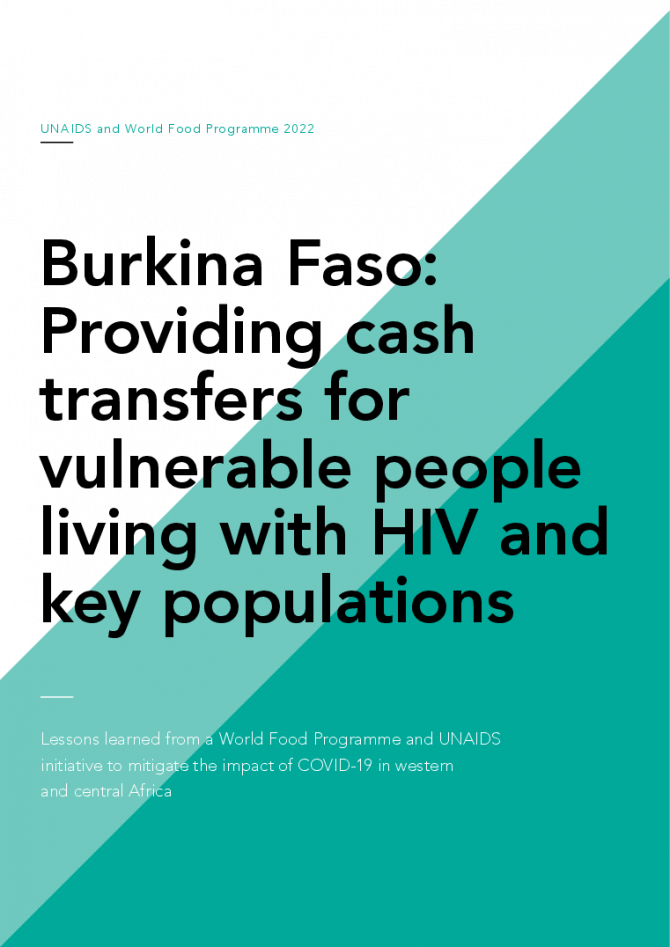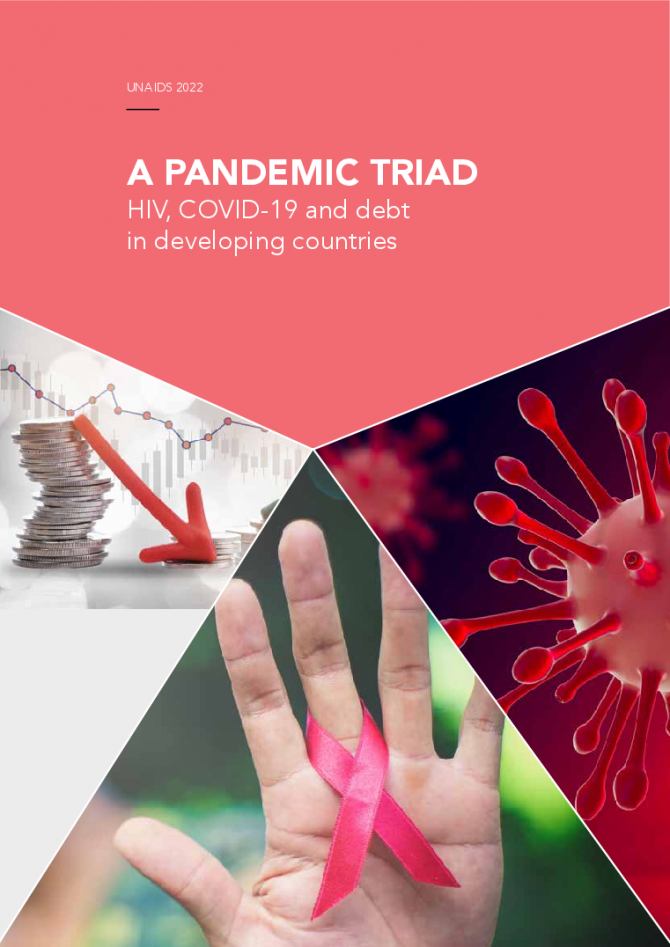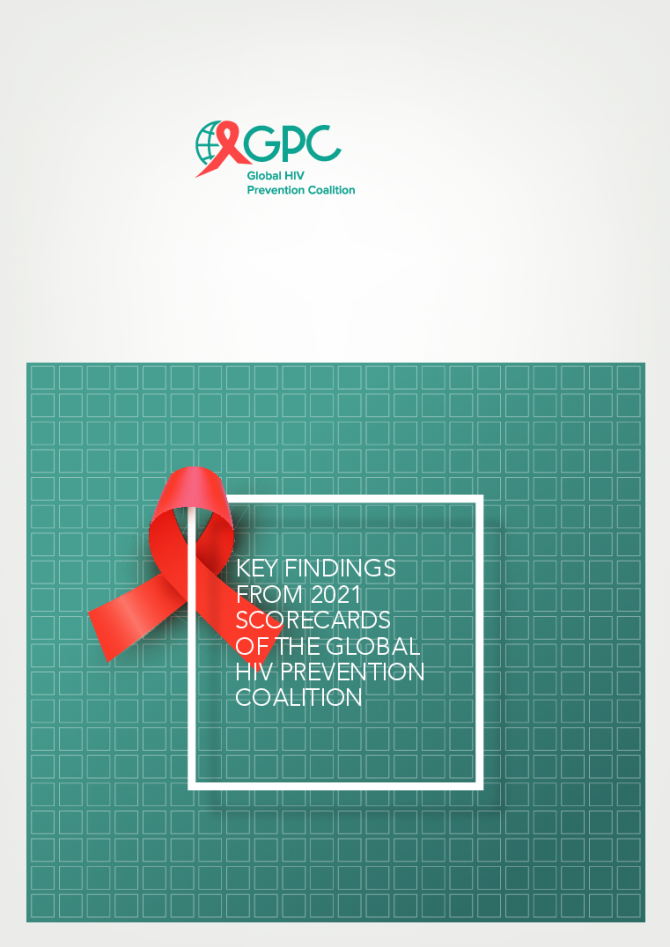Documents
Ending AIDS, ending inequalities — Fast-Track Cities
11 November 2022
The “ENDING AIDS, ENDING INEQUALITIES FAST-TRACK CITIES” report presents recent good practices from the 15 cities included in the joint UNAIDS-IAPAC Fast-Track Cities project supported by PEFPAR/USAID. It shows how cities are responding to HIV and other global health threats, building municipal capacity and strengthening partnerships, using data and spearheading innovation to protect and support their citizens. It further shows that, despite varying contexts and challenges, addressing inequalities and reaching those most vulnerable is central to advancing the HIV response towards ending AIDS by 2030.
Documents
Building a Workplace Culture of Equality—a Reflection on UNAIDS Culture Transformation Journey to Date
26 October 2022
Just as UNAIDS calls for ending inequalities to end AIDS, we are building an internal culture of equality through our Culture Transformation. This journey is grounded in intersectional feminist and anti-racist thinking and practice. It also provides reflective spaces, values introspection and offers opportunity to experiment with different ways of working and learning together.
Documents
Niger: Providing cash transfers for vulnerable people living with HIV and key populations — Lessons learned from a World Food Programme and UNAIDS initiative to mitigate the impact of COVID-19 in western and central Africa
08 July 2022
Located in the heart of the Sahel region, Niger is a vast landlocked country with a population of 24.2 million and the highest demographic growth rate in Africa, at nearly 4%. Although the country has made significant strides over the last decade to reduce poverty, it holds the lowest ranking on the 2019 Human Development Index. In 2019, more than 40% of the population was living in extreme poverty. In recent years, Niger has grappled with a significant influx of refugees fleeing conflicts in the region and internally displaced persons, which present additional socioeconomic challenges for the country. These factors are compounded by environmental degradation resulting in persistent and widespread food and nutrition insecurity, especially in rural areas.
Documents
Côte d’Ivoire: Providing cash transfers for vulnerable people living with HIV and key populations — Lessons learned from a World Food Programme and UNAIDS initiative to mitigate the impact of COVID-19 in western and central Africa
08 July 2022
Côte d’Ivoire is Francophone West Africa’s economic hub and is one of the world’s fastest growing economies. However, the country’s rapid socioeconomic development is not inclusive and it has one of the highest gender inequality rates in the world. An estimated 46% of its 25.5 million inhabitants are living in poverty. Food security remains an important challenge, notably for female-headed households. The country also suffers from the triple burden of malnutrition, represented by micronutrient deficiencies, undernutrition and overnutrition, with significant regional disparities.
Documents
Cameroon: Providing cash transfers for vulnerable people living with HIV and key populations — Lessons learned from a World Food Programme and UNAIDS initiative to mitigate the impact of COVID-19 in western and central Africa
07 July 2022
Cameroon is a lower-middle-income country in central Africa with more than 26 million inhabitants, approximately 39% of whom live below the poverty line. Ranked 153 out of 189 in the 2019 Human Development Index, the country benefits from rich natural resources; however, weak governance hinders its development and ability to attract investment. Cameroon is also dealing with humanitarian crises on three fronts: the far north, the east and the north- and south-west regions, whereby armed conflict has triggered significant internal displacements. The crises in these regions have weakened already fragile livelihoods; reduced access to health services, education and basic amenities; and compromised food security and nutrition. The coronavirus (COVID-19) pandemic has compounded these challenges on multiple levels.
Documents
Burkina Faso: Providing cash transfers for vulnerable people living with HIV and key populations — Lessons learned from a World Food Programme and UNAIDS initiative to mitigate the impact of COVID-19 in western and central Africa
07 July 2022
Burkina Faso is a low-income Sahelian country with a population of over 20 million, 40% of whom live below the national poverty line. Despite significant progress over the last two decades, Burkina Faso faces considerable development challenges, notably in health and education. Insecurity in the north and the east of the country caused a dramatic increase in the number of internally displaced persons (from 50 000 in January 2019 to more than 1 million in December 2020). This has created an unprecedented humanitarian crisis that has led to disruptions in access to education and health services, which have been further compounded by COVID-19.
Documents
Providing cash transfers for vulnerable people living with HIV and key populations — Lessons learned from a World Food Programme and UNAIDS initiative to mitigate the impact of COVID-19 in western and central Africa
08 July 2022
This document provides an overview of the WFP/UNAIDS rapid cash transfer pilot initiative launched in July 2020. The pilot aimed to mitigate the socioeconomic impact of COVID-19 among vulnerable people living with HIV and key populations in four priority countries in western and central Africa. This report complements four country-specific case studies by synthesizing programmatic insights and broader policy implications to support inclusive, HIV-sensitive social protection. In alignment with the Global AIDS Strategy 2021–2026, this report advocates for people-centred, responsive programming that fosters proactive partnership with communities and acknowledges the interdependencies among rights, social protection and health for people who are living with, affected by and at risk of HIV. See related country case studies: Burkina Faso | Cameroon | Côte d'Ivoire | Niger
Documents
Pandemic triad: HIV, COVID-19 and debt in developing countries
11 October 2022
This report analyses the intersection of HIV, COVID-19 and public debt in developing countries. The collision between COVID-19 and a crippling debt crisis have reversed decades of progress - putting present and future investments in health and HIV at risk. Pragmatic options to address the pandemic triad are proposed.
Documents
Key findings from the 2021 scorecards of the Global HIV Prevention Coalition
05 April 2022
This report summarizes the fifth round of GPC reporting. It is written at a time when countries were transitioning from the 2016–2020 to the 2021–2026 Global AIDS Strategy. The report provides a forward-looking perspective on findings as of 2021, as a foundation or benchmark for the accelerated progress that is needed over the next decade. Previous GPC progress reports have detailed the 2020 Road Map—the GPC’s 10-point action plan for strengthening national HIV prevention programmes— and have reported the gains and gaps observed in implementing the Road Map using the GPC’s scorecard method. This report focuses instead on the outcomes of these efforts. The narrative presents the outcomes that are captured in the 2021 scorecards, examining recent achievements in the 28 GPC focus countries, then summarizing country progress by intervention area, leading to five overarching findings. Although the scorecards and findings are of broader interest, the primary audiences for this report are the participants and stakeholders involved in the GPC at the country, regional and global levels. This document is also available in Portuguese
Documents
Integration of mental health and HIV interventions — Key considerations
28 April 2022
This publication is primarily intended for national and local policy-makers; global, regional, country and local programme implementers; organizations working in and providers of health, HIV, mental health and other relevant services; civil society; and community-based and community-led organizations and advocates. It brings together and refers to existing HIV and mental health, psychosocial support and other service provision guidelines, recommendations and tools, including the World Health Organization (WHO) Mental Health Gap Action Programme (mhGAP) mhGAP intervention guide and mhGAP operations manual; WHO, United Nations Office on Drugs and Crime and other guidelines and tools related to substance use; and WHO consolidated guidelines, tools and resources on HIV testing, prevention, treatment and care.

